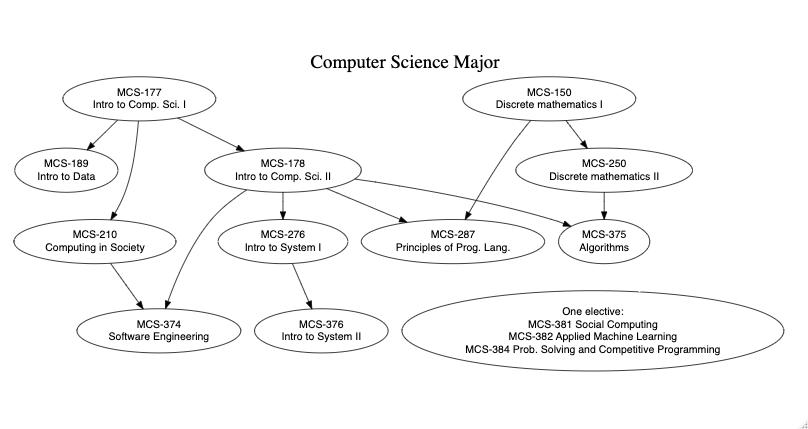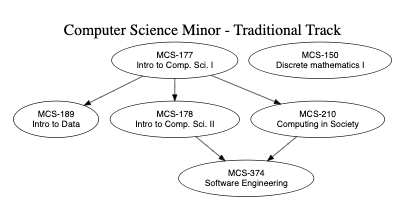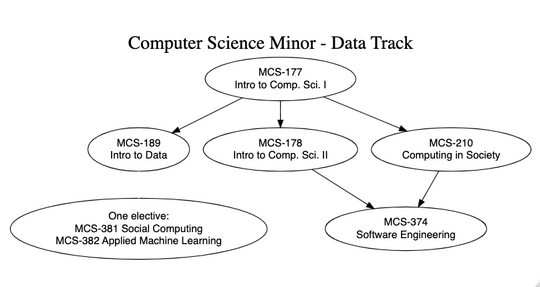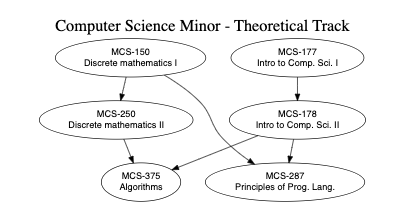Computer Science Advising Guide 2024 - 2025
Computer Science is more than just computer programming. It is the science of solving problems with computers. The ability to think analytically and logically, design creative and robust solutions, work in a team environment, and continue to learn new technologies is vital to stay competitive in a constantly changing world. As computers are now a part of almost every electronic device the need for qualified computer scientists is greater than ever.
-
Majors will solve problems using multiple programming languages, development platforms, and have a theoretical and practical understanding of the fundamental principles and concepts of computer science.
-
Caring instructors provide a solid underpinning of structured thinking, and analytical reasoning that prepare students to solve complex problems as a team or as an individual.
-
Graduates will be equipped with the problem-solving skills, practical experiences, and technical ability to succeed in the rapidly evolving digital landscape and find a career that suits their interests.
- To Declare a Computer Science major, use this form
Computer Science Major
Requirements for the 2023 - 2024 academic year computer science major can be found here.
A grade of C- or higher is necessary in all 12 courses used to satisfy the requirements of the major, which are as follows:
- MCS-150 Discrete Mathematics
- MCS-177 Intro. to Computer Science I
- MCS-178 Intro. to Computer Science II
- MCS-189 Intro to Data
- MCS-210 Computing in Society
- MCS-250 Discrete Mathematics II
- MCS 276 Intro to Systems I
- MCS-287 Principles of Programming Languages
- MCS-374 Software Engineering
- MCS-375 Algorithms
- MCS-376 Intro to Systems II
- One course from the following:
- MCS-381 Social Computing
- MCS-382 Applied Machine Learning
- MCS-384 Problem Solving and Competitive Programming

Computer Science Minor
As with the major in computer science, a minimum grade of C- must be attained in all six courses used to satisfy the minor. There are three tracks for a minor in computer science.
|
Computer Science Minor: Traditional |
|
|
 |
|
Computer Science Minor: Data |
|
|
 |
|
Computer Science Minor: Theoretical |
|
|
 |
Sample Student Plans
Each student should ideally lay out a schedule of their own showing what courses they plan to take and when they plan to take them. This schedule may not accurately forecast the future, but it is helpful nonetheless. The sample plans below are useful starting points in developing such an individual plan.
Typical Schedule (Version 1)
| Fall | Spring | |
| 1st Year | MCS-177 |
MCS-178, MCS-150 |
| 2nd Year |
MCS-189 |
MCS-210, MCS-250 |
| 3rd Year | MCS-375 |
MCS-287, MCS-374 |
| 4th Year | MCS-276 |
MCS-376, Elective |
Typical Schedule (Version 2)
| Fall | Spring | |
| 1st Year | MCS-177 | MCS-178, |
| 2nd Year | MCS-189 |
MCS-210, MCS-287 |
| 3rd Year |
MCS-150, MCS-276 |
MCS-250, MCS-376 |
| 4th Year | MCS-375 |
MCS-374, Elective |
Junior Year Study Abroad
| Fall | Spring | |
| 1st Year | MCS-177 | MCS-178, MCS-150 |
| 2nd Year | MCS-189 |
MCS-210, MCS-250, MCS-287 |
| 3rd Year | Abroad | Abroad |
| 4th Year |
MCS-276, MCS-375 |
MCS-374, MCS-376, Elective |
Fast Track: 2.5 Years
| Fall | Spring | ||
| 1st Year | --- | --- | |
| 2nd Year | --- | MCS-150, MCS-177 | |
| 3rd Year |
MCS-178, MCS-189 |
MCS-210, MCS-250, MCS-287 |
|
| 4th Year |
MCS-276, MCS-375 |
MCS-374, MCS-376, Elective |